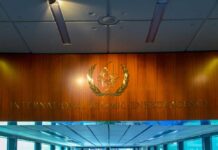Immigrants and ethnic minorities in Russia have been hit particularly hard by President Vladimir Putin’s inaction in the wake of a deadly terror assault in Moscow last month carried out by Tajik extremists. While the Kremlin has placed the blame on the United States, Britain, and Ukraine for the assault, it has found easier targets at home, increasing its crackdown on non-white Russians, migrants, and central Asians.
In the wake of the March 22 assault on Crocus City Hall, Russian police have started searching non-white individuals on the street and raiding migrant dorms in other towns. Forty migrants were apprehended at their workplace sixty kilometers outside of Moscow toward the end of March. Along with extensive searches, law enforcement officials arraigned those suspected of violating migratory regulations immediately as part of a massive operation. Consequently, 466 people were ordered to leave Russia.
Authorities from Tajikistan, Uzbekistan, and Kyrgyzstan have all released comments warning their residents against attending large-scale protests in Russia and urging them to remain at home. These countries are typical destinations for many Russian migrants. But the chill of the Kremlin’s cold breath isn’t limited to refugees. Xenophobia has been on the rise since the incident, according to Indigenous of Russia Foundation head Victoria Maladaeva.
Migrants, most of whom go to Russia from nations in Central Asia, are targets of a top-down crackdown. Without providing any proof, Russia’s Prosecutor General Igor Krasnov informed Putin on March 26 that migrant-related crimes in Russia had increased by 75% in 2023. Following the Crocus incident, law enforcement initiated a campaign against migrants. Annual figures from the interior ministry show that the number of foreign nationals committing crimes reduced by 9% in 2023, with a 7% reduction among foreign nationals from countries that were part of the Soviet CIS.
Since the terror incident, the Russian government has launched an onslaught against migrants, which has, in turn, incited bigotry and prejudice against any Russians who are not Slavic, including indigenous peoples who are not of European descent.
People have been assaulted and harassed, according to first-hand accounts from Russia. Those needing emotional or mental assistance may call the foundation’s helpline.


















